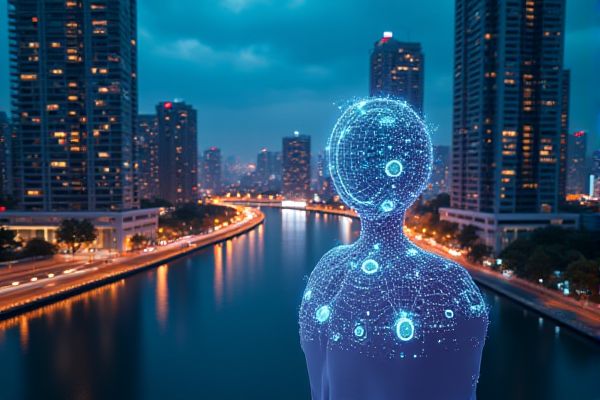
AI plays a crucial role in optimizing urban infrastructure, enhancing traffic management, and improving public safety in smart cities. Machine learning algorithms analyze vast amounts of data from sensors and IoT devices, enabling efficient resource allocation and predictive maintenance. Smart waste management systems utilize AI to optimize collection routes, reducing costs and environmental impact. By facilitating responsive governance and personalized services, AI fosters sustainable urban living and enhances the quality of life for residents.
AI usage in smart city development
Intelligent Traffic Management
AI can enhance intelligent traffic management systems by analyzing real-time data from sensors and cameras to optimize traffic flow. For instance, cities like Barcelona utilize AI algorithms to adjust traffic signals based on current congestion levels, potentially reducing travel times. Implementing such technologies may offer advantages in minimizing environmental impacts by lowering emissions from idle vehicles. Improved traffic management through AI could also lead to safer road conditions and fewer accidents.
Energy Consumption Optimization
AI can significantly enhance energy consumption optimization in smart city development. By analyzing real-time data, AI algorithms can predict energy demand patterns and manage resources more efficiently. For instance, cities like Barcelona have implemented AI-driven systems to optimize street lighting based on pedestrian activity. This not only lowers energy costs but also reduces carbon emissions, showcasing the potential benefits of AI integration in urban environments.
Smart Waste Management
AI can enhance smart waste management systems by optimizing collection routes and schedules. For example, using AI algorithms, the city of Barcelona has improved its waste collection efficiency and reduced operational costs. Predictive analytics can also help anticipate waste generation patterns, allowing for better resource allocation. This possibility leads to a more sustainable urban environment and improved public health.
Public Safety and Surveillance
AI can enhance public safety in smart cities by analyzing real-time data from surveillance cameras to identify potential threats. For example, the integration of AI in urban planning could optimize emergency response times through predictive analytics. Smart sensors can provide valuable insights into traffic patterns and crowd behavior, thus enabling proactive measures. Implementing these technologies might lead to improved resource allocation and overall citizen safety.
Predictive Maintenance of Infrastructure
Predictive maintenance in smart city development can enhance infrastructure longevity and reduce operational costs. Utilizing AI algorithms allows for real-time monitoring and data analysis, identifying potential failures before they occur. For instance, city transportation systems can leverage predictive maintenance to ensure optimal performance and safety. This approach can lead to increased efficiency and improved service delivery for urban residents.
Environmental Monitoring and Analysis
AI can significantly enhance environmental monitoring and analysis in smart city development, improving data accuracy and decision-making. For instance, using AI algorithms can optimize air quality assessments, allowing cities to respond more effectively to pollution levels. The integration of AI in these systems may lead to improved urban planning and better resource allocation. As cities increasingly adopt smart technologies, the potential for AI to contribute to sustainable development becomes increasingly evident.
Urban Mobility Solutions
AI can enhance urban mobility solutions in smart city development by optimizing traffic flow and reducing congestion. For example, through predictive analytics, cities can manage public transport schedules more effectively, potentially increasing ridership and satisfaction. This technology also allows for real-time monitoring of transportation systems, enabling quicker responses to issues. The integration of AI in these systems offers the possibility of creating more efficient and user-friendly urban environments.
Personalized Citizen Services
The integration of AI in smart city development can enhance personalized citizen services significantly. By analyzing data from sources like transportation systems and public utilities, cities can tailor services to meet individual needs. For example, AI can optimize public transportation routes based on real-time passenger demand, improving efficiency and convenience. This capability not only increases user satisfaction but also supports more sustainable urban planning and resource allocation.
Water Resource Management
AI can optimize water resource management in smart cities by analyzing consumption patterns and predicting demand. For example, a city like Singapore uses AI algorithms to monitor water quality and detect leaks in real time. This advanced technology can help increase efficiency, reduce waste, and improve maintenance processes. As a result, the integration of AI may lead to enhanced sustainability and cost savings for urban infrastructure.
Data-Driven Urban Planning
AI can significantly enhance smart city development through data-driven urban planning. By utilizing algorithms and data analytics, cities can optimize resource allocation, improve traffic management, and enhance public safety. For example, cities like Singapore employ AI technologies to analyze traffic patterns, enabling more efficient transportation systems. This approach not only reduces congestion but also enhances residents' quality of life, showcasing the potential advantages of integrating AI in urban environments.
 techknowy.com
techknowy.com